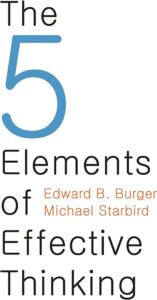Can you recommend a book for . . .?”
“What are you reading right now?”
“What are your favorite books?”
I get asked those types of questions a lot, which is why once a month I share a book that I’ve particularly liked, why I liked it, and several of my key takeaways.
This month’s pick is The 5 Elements of Effective Thinking by Edward Burger and Michael Starbird, which teaches you how to become a better problem solver and critical thinker, and thus how to live a better life.
Because in some ways, life is a big IQ test—a long series of difficult problems that you must solve, often with limited time, information, money, and other resources.
What’s more, like in chess, to win in life, you don’t just have to make far more good moves than bad ones—you also have to never make certain catastrophic moves that’ll forfeit the advantages of all of your previous moves if not the game altogether.
So, books like The 5 Elements of Effective Thinking are worth reading and internalizing, and the three primary reasons I enjoyed this book and recommend it are:
- It delivers a high amount of value per page because, unlike many self-help books, it hasn’t been overextended with boring and unnecessary minutiae and anecdotes.
- It contains a number of profound ideas that, if embraced, can produce a quantum leap in your ability to make winning decisions.
- It’s highly practical and provides many concrete examples of how you can immediately apply the information in your life.
Here are my 10 favorite takeaways from it.
My 10 Favorite Takeaways from The 5 Elements of Effective Thinking
1
“Often we are persuaded by authority and repetition rather than by evidence and reality.”
2
“One profound habit of thinking individuals is to first acknowledge their biases and then intentionally overcome them. Asking challenging questions can help. Passionately argue an issue from the opposite point of view, and ask probing and difficult questions that challenge your original stance. Be brutally honest and see what’s actually there rather than what’s expected. Get in the habit of asking, “Do I really know?” and refuse to accept assertions blindly.”
3
“There is nothing so useless as doing efficiently that which should not be done at all.”
—Peter Drucker
4
“Solutions to little problems generate solutions to great problems.”
5
“. . . good progress is often the herald of great progress.”
6
“Do you or don’t you truly know the basics? Consider a subject you think you know or a subject you are trying to master. Open up a blank document on your computer. Without referring to any outside sources, write a detailed outline of the fundamentals of the subject. Can you write a coherent, accurate, and comprehensive description of the foundations of the subject, or does your knowledge have gaps? Do you struggle to think of core examples? Do you fail to see the overall big picture that puts the pieces together?”
7
“The simple and familiar hold the secrets of the complex and unknown. The depth with which you master the basics influences how well you understand everything you learn after that.”
8
“You can’t always get it right, but you can always get it wrong and learn something. Get to failure fast.”
9
“The goal is to not make stupid, obvious mistakes. Good mistakes lead to insights that lead to workable solutions and good results.”
10
“Don’t try to create something great. Create something bad and then make it great.”











